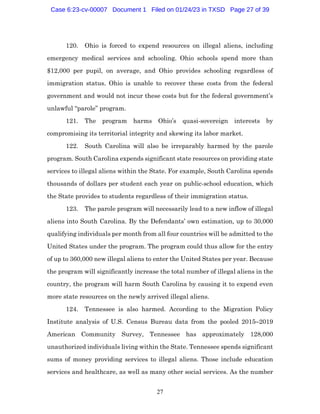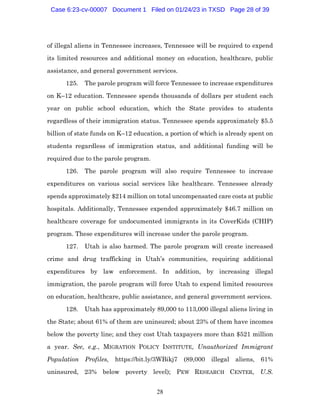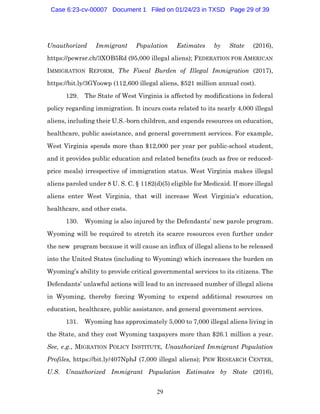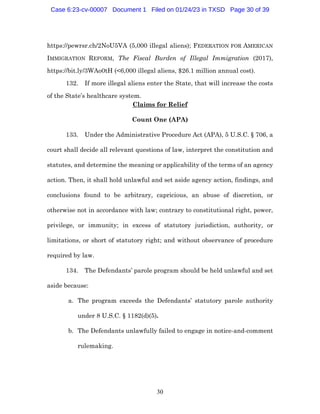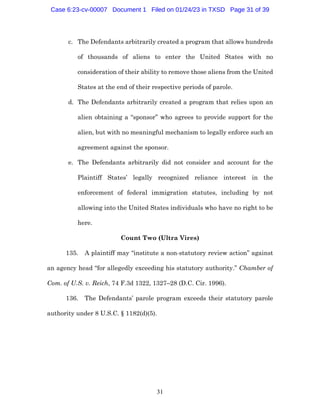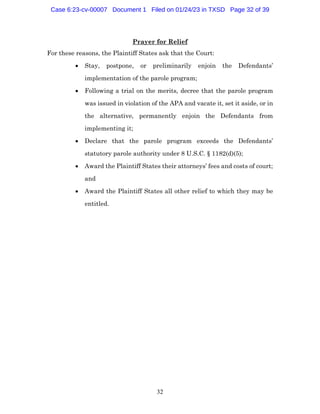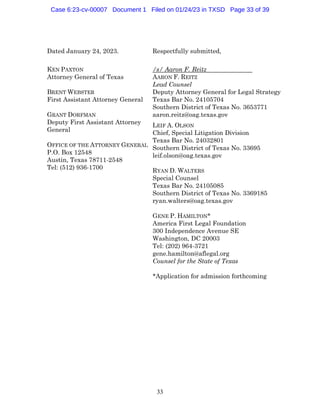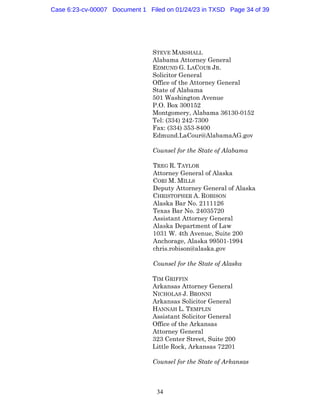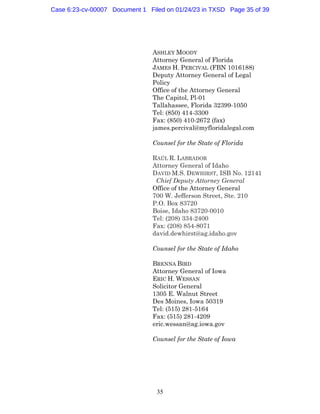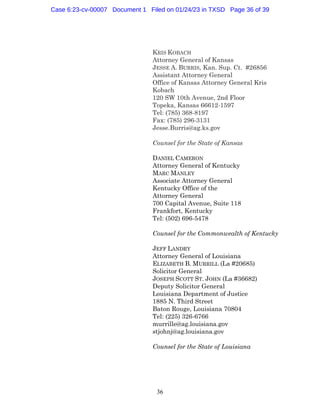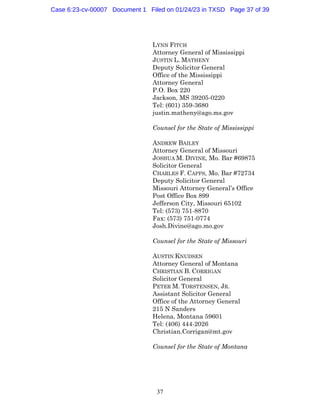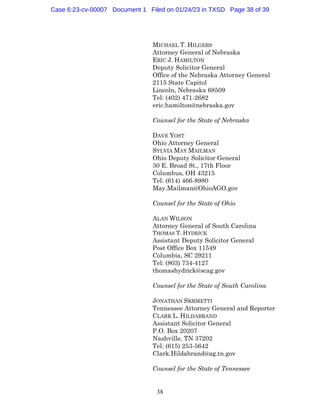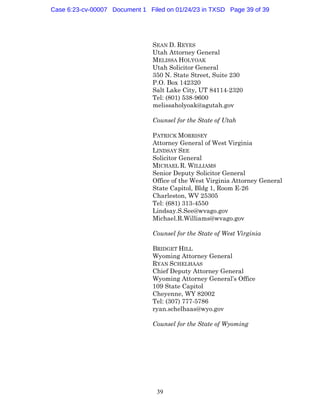The document is a complaint filed in United States District Court by 20 U.S. states against the Department of Homeland Security and other federal agencies and officials. The complaint challenges DHS's new parole program that allows up to 360,000 aliens annually from Cuba, Haiti, Nicaragua, and Venezuela to enter the US and receive work authorization for up to two years. The plaintiff states argue the program exceeds DHS's limited parole authority and was established without proper rulemaking procedures. They claim the program will cause them irreparable harm by allowing large numbers of additional aliens to enter their states. The complaint asks the court to declare the program unlawful and enjoin its implementation.
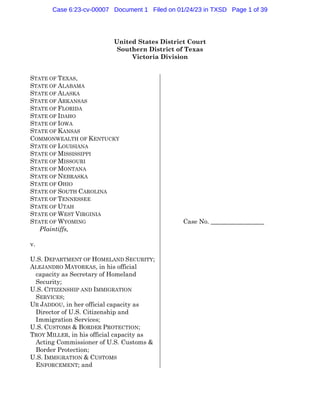
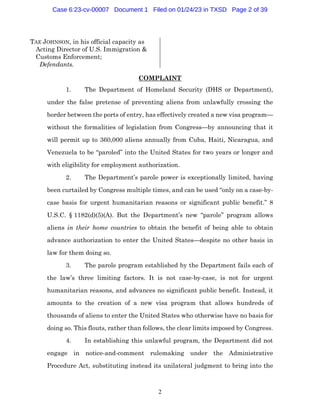
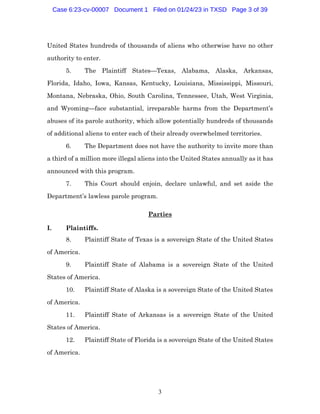
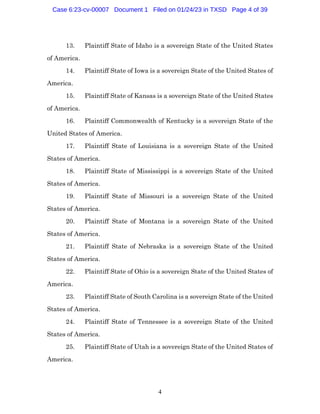
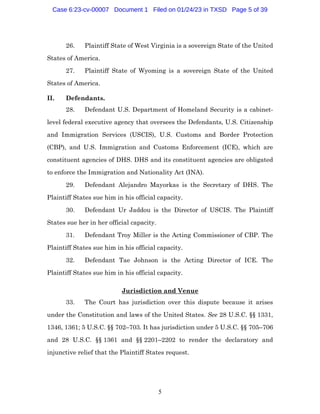
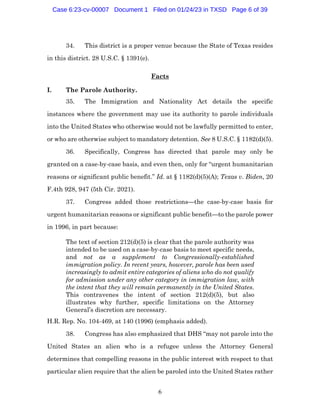
![7
than be admitted as a refugee[.]” 8 U.S.C. § 1182(d)(5)(B); see also Texas v.
Biden, 20 F.4th at 994.
39. As the U.S. Court of Appeals for the Fifth Circuit stated less than
two years ago, “[q]uintessential modern uses of the parole power include, for
example, paroling aliens who do not qualify for an admission category but have
an urgent need for medical care in the United States and paroling aliens who
qualify for a visa but are waiting for it to become available.” Id. at 947. But the
power is not unlimited: “DHS cannot use that power to parole aliens en masse;
that was the whole point of the ‘case-by-case’ requirement that Congress added
in IIRIRA.” Id. at 997.
40. The Supreme Court recently affirmed the limited nature of the
parole power, noting that it “is not unbounded: DHS may exercise its discretion
to parole applicants ‘only on a case-by-case basis for urgent humanitarian
reasons or significant public benefit.’ … And under the [Administrative
Procedure Act], DHS’s exercise of discretion within that statutory framework
must be reasonable and reasonably explained.” Biden v. Texas, 142 S. Ct. 2528,
2543 (2022).
II. The Parole Program.
41. On December 22, 2022, Secretary Mayorkas issued a decision
memorandum that created a new parole program for nationals of Cuba, Haiti,
Nicaragua, and Venezuela. Although the Defendants have referred to this
memorandum as authority for the new parole program, see, e.g.,
Implementation of a Parole Process for Haitians, 88 Fed. Reg. 1243 (Jan. 9,
2023), they have not publicly released it.
42. On January 5, 2023, President Biden and the Defendants
announced the creation of the new parole program, which was modeled off
Case 6:23-cv-00007 Document 1 Filed on 01/24/23 in TXSD Page 7 of 39](https://image.slidesharecdn.com/complaint-filed1-230125141628-e1437bb9/85/Complaint-Filed-1-pdf-7-320.jpg)
![8
recent programs the Defendants had created for nationals of Ukraine and
Venezuela. Press Release, Department of Homeland Security, DHS Continues
to Prepare for End of Title 42; Announces New Border Enforcement Measures
and Additional Safe and Orderly Processes, (Jan. 5, 2023)
https://bit.ly/3VR83z2.
43. According to the Department’s announcement, the program “will
provide a lawful and streamlined way for qualifying nationals of Cuba, Haiti,
Nicaragua, and Venezuela to apply to come to the United States, without
having to make the dangerous journey to the border.” Id.
44. Secretary Mayorkas said in the press release announcing the
program “[w]e can provide humanitarian relief consistent with our values, cut
out vicious smuggling organizations, and enforce our laws.” Id. He added
“[i]ndividuals who are provided a safe, orderly, and lawful path to the United
States are less likely to risk their lives traversing thousands of miles in the
hands of ruthless smugglers, only to arrive at our southern border and face the
legal consequences of unlawful entry.” Id.
45. Without authority, the Defendants have decreed that, subject to
an alien obtaining a “supporter in the United States who commits to providing
financial and other support” and certain background checks,“[aliens] can seek
advance authorization to travel to the United States, and be considered, on a
case-by-case basis, for a temporary grant of parole for up to two years,
including employment authorization[.]” Id. (emphasis added).
46. The Defendants have further decreed that the program “will
allow up to 30,000 qualifying nationals per month from all four of these
countries to reside legally in the United States for up to two years and to
receive permission to work here, during that period.” Id. (emphasis added).
Case 6:23-cv-00007 Document 1 Filed on 01/24/23 in TXSD Page 8 of 39](https://image.slidesharecdn.com/complaint-filed1-230125141628-e1437bb9/85/Complaint-Filed-1-pdf-8-320.jpg)
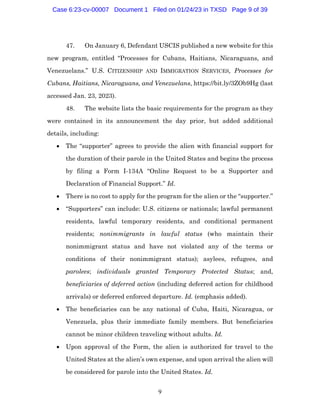
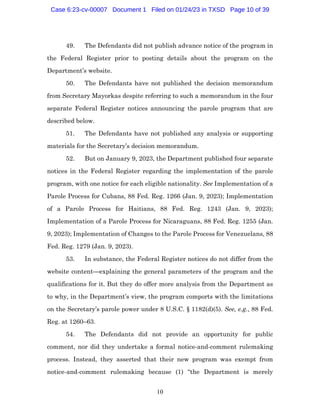
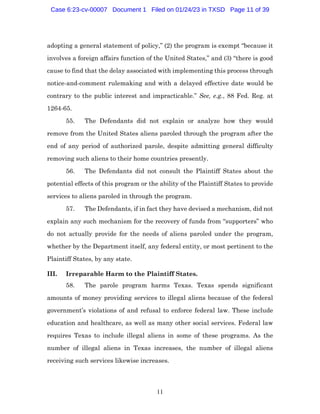
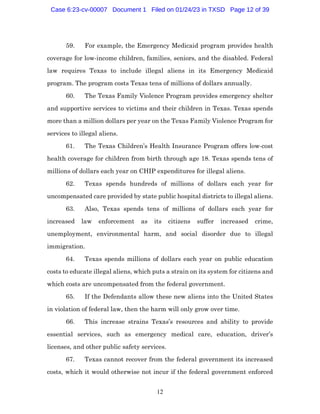
![13
the law. This affects Texas’s sovereign interests in its territory and its ability
to properly carry out such interests on behalf of the citizens of the State.
68. Alabama also “bears many of the consequences of unlawful
immigration.” Arizona v. U.S., 567 U.S. 387, 397 (2012). The State incurs
significant costs providing services to illegal aliens that it would otherwise not
incur if the federal government enforced the federal immigration law. Alabama
currently has tens of thousands of illegal aliens living in the State. Recent
reports estimate that approximately 55,000 to 73,000 illegal aliens are living
in the State; about 68% of them are uninsured; about 34% of them have
incomes below the poverty line; and these illegal aliens cost Alabama taxpayers
more than $324.9 million a year. See, e.g., MIGRATION POLICY INSTITUTE,
Unauthorized Immigrant Population Profiles, https://bit.ly/3kws01c (62,000
illegal aliens, 68% uninsured, 34% below poverty level) (last visited Jan. 23,
2023); PEW RESEARCH CENTER, U.S. Unauthorized Immigrant Population
Estimates by State (2016), https://pewrsr.ch/2NoU5VA (55,000 illegal aliens);
FEDERATION FOR AMERICAN IMMIGRATION REFORM, The Fiscal Burden of Illegal
Immigration, (2017), https://bit.ly/3ZYDMBU (73,190 illegal aliens, $324.9
million annual cost).
69. While Alabama is not a contemplated “port[] of entry” according
to DHS’s press release, see Press Release, Department of Homeland Security,
DHS Continues to Prepare for End of Title 42; Announces New Border
Enforcement Measures and Additional Safe and Orderly Processes (Jan. 5,
2023) (https://bit.ly/3QYnMvo), the federal government itself has
acknowledged that “the flow of migration directly impacts not only border
communities and regions, but also destination communities and healthcare
resources of both,” 86 Fed. Reg. at 42,835.
Case 6:23-cv-00007 Document 1 Filed on 01/24/23 in TXSD Page 13 of 39](https://image.slidesharecdn.com/complaint-filed1-230125141628-e1437bb9/85/Complaint-Filed-1-pdf-13-320.jpg)
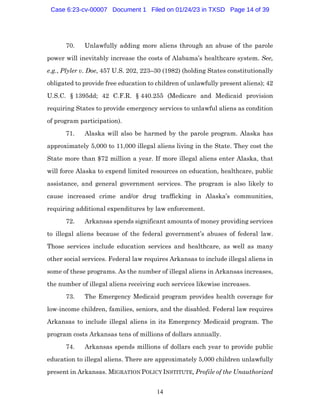
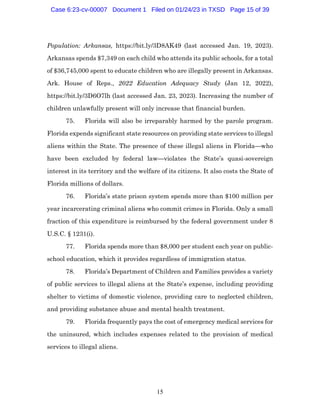
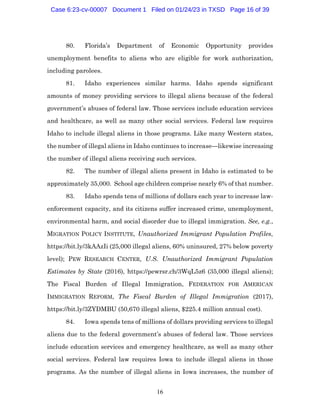
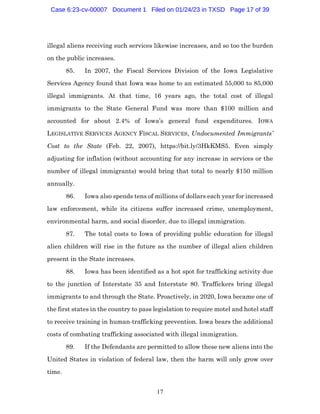
![18
90. This strains Iowa’s resources and ability to provide essential
services, such as emergency medical care, public education, and other public
safety services.
91. Iowa cannot recover from the federal government its increased
costs, which it would otherwise not incur if the federal government enforced
the law. That affects Iowa’s sovereign interests in its territory and its ability
to carry out properly such interests on behalf of the citizens of the State.
92. Kansas is also harmed by the Defendants’ new parole program.
93. Kansas will be required to stretch its scarce resources even
further under the parole program because, under the program, the Defendants
will monthly admit into the interior many thousands of new aliens who will at
least temporarily reside there. This will be in addition to the many aliens who
illegally cross the border every day (whom the Defendants fail to apprehend).
See Bradford Betz, Mayorkas Testifies More Than 389,000 Migrant ‘Gotaways’
at Border, FOX NEWS (Apr. 28, 2022), https://fxn.ws/3H0U04z; U.S. CUSTOMS
AND BORDER PROTECTION, On a Typical Day in Fiscal Year 2021, CBP…,
https://bit.ly/3kDcD7d (last accessed Jan. 18, 2023) (“[CBP] [c]onducted …
1,703 apprehensions between U.S. ports of entry[,] 25 arrests of wanted
criminals at U.S. ports of entry[,] [and] 723 refusals of inadmissible persons at
U.S. ports of entry”).
94. The program will result in increased crime and drug trafficking
in Kansas communities, requiring additional expenditures by Kansas law
enforcement. This is because at least some proportion of those aliens will come
to Kansas. That means more people in Kansas, at least some proportion of
whom will engage in illegal activity and whom law-enforcement officials will
inevitably encounter. See, e.g., United States v. Salinas-Calderon, 728 F.2d
1298, 1299–1300 (10th Cir. 1984) (recounting details of a traffic stop conducted
Case 6:23-cv-00007 Document 1 Filed on 01/24/23 in TXSD Page 18 of 39](https://image.slidesharecdn.com/complaint-filed1-230125141628-e1437bb9/85/Complaint-Filed-1-pdf-18-320.jpg)
![19
by a Kansas Highway Patrol Trooper who encountered six individuals in the
bed of a pickup truck who admitted they were unlawfully present in the U.S.);
see also Tim Hrenchir, City settles police SUV crash lawsuit for $335K, TOPEKA
CAPITAL-JOURNAL, Mar. 12, 2021, at A4 (“Topeka’s city government has agreed
to pay $335,000 to settle a lawsuit over an April 2016 crash in which a vehicle
driven by an [illegal alien] was hit by a Topeka police SUV, which allegedly
went through a red light while responding to a call with its lights and siren
on.”); Glenn E. Rice, Man Who Heard Voices Charged With Murdering Tattoo
Artist, KAN. CITY STAR (May 22, 2018), https://bit.ly/3wpXqca, (discussing an
illegal alien who allegedly shot and killed another motorist while driving in
Kansas City, shot and wounded two men minutes apart in Clay County, and
burglarized a residence, stole firearms, and tampered with a motor vehicle in
Jackson County); THE ASSOCIATED PRESS, Murder & Abduction Suspect Living
in U.S. Illegally, CBS NEWS DFW (Nov. 24, 2016), https://cbsn.ws/3Wy24Qf (“A
Texas woman accused of [travelling to Wichita, Kansas and] killing a [Wichita]
mother and taking her baby was in the U.S. illegally when she was released
from [Sedgwick County (KS) Jail] this summer before immigration officials had
a chance to request she be held, law enforcement authorities said.”).
95. Additionally, by incentivizing aliens from Cuba, Haiti, Nicaragua,
and Venezuela to obtain advance authorization to enter the United States, the
parole program will force Kansas to expend its limited resources on education,
healthcare, public assistance, and general government services on even more
individuals who are not U.S. citizens. See Plyler v. Doe, 457 U.S. 202, 223–30
(1982) (establishing that undocumented school-age children are entitled to a
free public education); KAN. STATE DEP’T OF EDUC., EXPENDITURES PER PUPIL:
2020–2021 at 8 (Jan. 2021) (noting 2020–2021 school year expenditures per
pupil were approximately $15,869), available at https://bit.ly/3ZPAelj;
Case 6:23-cv-00007 Document 1 Filed on 01/24/23 in TXSD Page 19 of 39](https://image.slidesharecdn.com/complaint-filed1-230125141628-e1437bb9/85/Complaint-Filed-1-pdf-19-320.jpg)
![20
KANCARE OMBUDSMAN, KANCARE GENERAL INFORMATION FACT SHEET
(Updated Nov. 19, 2020), available at https://bit.ly/3Da3MAd (“KanCare
Eligible Non-Citizens[:] To be considered eligible for any of the KanCare
medical assistance programs, non-U.S. citizens must hold (1) legal residency
in the U.S. for 5 years or more or (2) hold a certain immigration status.”); KAN.
DEP’T OF HEALTH & ENV’T, DIV. OF HEALTH CARE FIN., MKEESM MANUAL
§§ 2142, 2146 (Jan. 2023), available at https://bit.ly/3wjMLzX (pertaining to
“Qualified Non-Citizen Status” and “Documentation of Legal Status”); KAN.
DEP’T OF HEALTH & ENV’T, DIV. OF HEALTH CARE FIN., A-1 NON-CITIZEN
QUALIFICATION CHART 1 (Jan. 2023), available at https://bit.ly/3WuYXZk (“The
purpose of this chart is to provide policy guidance for eligibility staff when
addressing requests for coverage when the individual attests to being a non-
citizen and provides supporting documentation.”); see also KAN. DEP’T OF
HEALTH AND ENV’T, MEDICAID TRANSFORMATION 214 (Jan. 2009), available at
https://bit.ly/3ZTllhH (explaining Kansas’s administration of “SOBRA,” noting
“[illegal aliens] have been found to use hospital and emergency services at over
twice the rate of the overall U.S. population,” and observing that there is a
“large number of” “uninsured” illegal aliens).
96. Kansas has approximately 69,000 to 85,000 illegal aliens already
living in the State, about 64% of whom are uninsured and about 25% of whom
have incomes below the poverty line. See MIGRATION POLICY INSTITUTE, Profile
of the Unauthorized Population: Kansas, https://bit.ly/3GVy4I6 (69,000 illegal
aliens, 81% from “Mexico and Central America,” 64% uninsured, 11% below
50% of the poverty level); PEW RESEARCH CTR., U.S. Unauthorized Immigrant
Population Estimates by State, 2016 (Feb. 5, 2019), https://pewrsr.ch/2NoU5VA
(75,000 illegal aliens). These illegal aliens cost Kansas taxpayers more than
$377 million per year. See FED’N FOR AM. IMMIGRATION REFORM, The Fiscal
Case 6:23-cv-00007 Document 1 Filed on 01/24/23 in TXSD Page 20 of 39](https://image.slidesharecdn.com/complaint-filed1-230125141628-e1437bb9/85/Complaint-Filed-1-pdf-20-320.jpg)
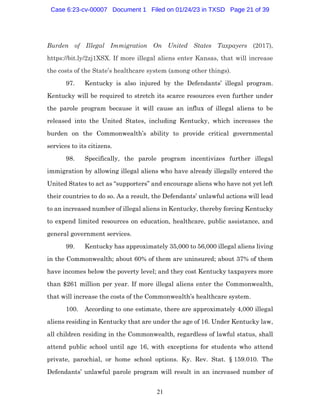
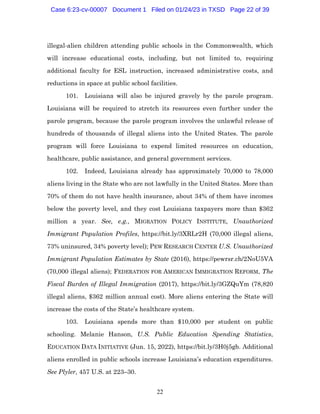
![23
104. Defendant DHS has previously recognized that Louisiana “is
directly and concretely affected by changes to DHS rules and policies that have
the effect of easing, relaxing, or limiting immigration enforcement. Such
changes can negatively impact [Louisiana’s] law enforcement needs and
budgets, as well as its other important health, safety, and pecuniary interests
of the State of Louisiana.” Memorandum of Understanding Between DHS and
the Louisiana Department of Justice at 1-2. DHS has also recognized that
“rules, policies, procedures, and decisions that could result in significant
increases to the number of people residing in a community” will “result in
direct and concrete injuries to [Louisiana], including increasing the rate of
crime, consumption of public benefits and services, strain upon the healthcare
system, and harm to the environment, as well as increased economic
competition with the State of Louisiana's current residents for, among other
things, employment, housing, goods and services.” Id. at 3.
105. Louisiana cannot recover its increased costs, which it would
otherwise not incur if the federal government enforced the law, from the
federal government. This affects Louisiana’s sovereign interests in its territory
and its ability to carry out properly such interests on behalf of the citizens of
the State.
106. Mississippi is also injured by the parole program. Mississippi will
be required to stretch its scarce resources even further under the program
because it will cause an influx of illegal aliens who otherwise have no basis for
entering the country. The program will further incentivize and exacerbate
illegal immigration, and thus will force Mississippi to expend limited resources
on education, healthcare, public assistance, law enforcement, and general
government services.
Case 6:23-cv-00007 Document 1 Filed on 01/24/23 in TXSD Page 23 of 39](https://image.slidesharecdn.com/complaint-filed1-230125141628-e1437bb9/85/Complaint-Filed-1-pdf-23-320.jpg)
![24
107. Mississippi has approximately 20,000 to 28,000 illegal aliens
living in the State; about 75% of them are uninsured; about 49% of them have
incomes below the poverty level; and they cost Mississippi taxpayers more than
$117 million per year. If more illegal aliens enter the State, that will increase
the costs to the State’s healthcare system.
108. Missouri is directly and adversely affected by increases in illegal
immigration at the southern border. Recent studies have established that
significant numbers of illegal aliens who enter the United States end up
residing in Missouri. See Texas v. Biden, 554 F. Supp. 3d 818, 838 (N.D. Tex.
2021), aff’d, 20 F.4th 928 (5th Cir. 2021), rev’d on other grounds, 142 S. Ct.
2528 (2022). Like Texas, Missouri experiences pocketbook injuries as a result
of the unlawful presence of illegal aliens in the State in the form of education,
healthcare, and law-enforcement costs. These financial injuries are irreparable
because Missouri has no plausible recourse to recoup them.
109. Illegal aliens and their children receive education benefits from
Missouri at Missouri’s expense. See Plyler v. Doe, 457 U.S. 202, 205, 230 (1982)
(holding that the Constitution prohibits States from “deny[ing] to
undocumented school-age children the free public education that it provides to
children who are citizens of the United States or legally admitted aliens”).
110. As the District Court for the Northern District of Texas has found,
the costs to “Missouri … of providing public education for illegal alien children
will rise … as the number of illegal alien children present in the State
increases.” Texas, 554 F. Supp. 3d at 838.
111. “Some aliens who … are being released or paroled into the United
States … will use state-funded healthcare services or benefits in … Missouri.”
Id. “The total costs to [Missouri] will increase as the number of aliens within
[Missouri] increases.” Id. at 839.
Case 6:23-cv-00007 Document 1 Filed on 01/24/23 in TXSD Page 24 of 39](https://image.slidesharecdn.com/complaint-filed1-230125141628-e1437bb9/85/Complaint-Filed-1-pdf-24-320.jpg)
![25
112. Federal law requires Missouri to include illegal aliens in its
Emergency Medicaid program, which provides health coverage for low-income
children, families, seniors, and disabled persons. 42 C.F.R. § 440.255(c).
113. Missouri is also a destination State and hub for human-
trafficking crimes within the United States, due to its situation at the
confluence of several major interstate highways. See Texas, 554 F. Supp. 3d at
839 (“Missouri is … a destination and transit State for human trafficking of
migrants from Central America who have crossed the border illegally.”). Illegal
aliens are disproportionately the victims of these crimes. Some illegal aliens
also commit crimes. Human-trafficking and other crimes committed by or
against illegal aliens inflict irreparable costs on Missouri, both in law-
enforcement costs and in providing resources for victims. See id. (finding that
“[h]uman trafficking” arising from and involving increases in unlawful
immigration “causes fiscal harm to … Missouri”).
114. Additionally, Missouri is suffering a “fentanyl crisis,” and that
crisis is “worsening.” Alex Smith, Missouri’s Fentanyl Crisis is Worsening, But
Patients Can’t Get Treatment for Substance Abuse, ST. LOUIS PUBLIC RADIO
(Apr. 5, 2022), https://bit.ly/3QVv9nr. “St. Louis ranks among the deadliest
cities in the country for overdose deaths among African Americans, and … the
Black community seems caught between organized crime’s fentanyl push and
ineffective efforts to stop it.” Id. Drug smugglers unlawfully entering the
United States through the southern border are critical suppliers for
distributors of fentanyl and other illegal substances in Missouri and elsewhere
in the United States. See Anna Giaritelli, Is America’s Immigration Crisis
Causing the Fentanyl Epidemic?, WASHINGTON EXAMINER (July 13, 2022),
https://bit.ly/3wlho7Z. In addition to devastating the lives and health of
Missouri’s citizens, drug-related and other crimes committed by or against
Case 6:23-cv-00007 Document 1 Filed on 01/24/23 in TXSD Page 25 of 39](https://image.slidesharecdn.com/complaint-filed1-230125141628-e1437bb9/85/Complaint-Filed-1-pdf-25-320.jpg)
![26
illegal aliens impose major healthcare and law-enforcement costs on the State.
An increased influx of illegal aliens will exacerbate these problems. See Texas,
554 F. Supp. 3d at 839 (finding that “[s]ome aliens who … are being released
or paroled into the United States … will commit crimes in … Missouri”).
115. An increased influx of illegal aliens will also affect Missouri’s
labor market and reduce job opportunities for U.S. citizens and aliens lawfully
present in Missouri, as illegal aliens frequently compete for jobs at lower wages
than workers who are lawfully present. Missouri has a large agricultural
sector. Illegal aliens unlawfully present in Missouri distort Missouri’s labor
market and inflict irreparable injury on both the State and its citizens.
116. The State of Montana is acutely affected by modifications in
federal policy regarding immigration.
117. Montana bears the costs of illegal aliens, including their U.S.-
born children, and is forced to expend resources on education, healthcare,
public assistance, and general government services.
118. Because Montana has no state sales tax, many illegal aliens pay
virtually no state taxes. Therefore, the costs of all the public services they
consume are borne by lawfully present taxpayers.
119. Ohio will also be irreparably harmed by the parole program. Ohio
expends significant state resources on providing state services to illegal aliens
within the State. The illegal parole program will increase the number of illegal
aliens in Ohio. While illegal border crossings most severely affect border
States, the parole program requires aliens to “provide for their own commercial
travel” to the United States, and therefore will affect States beyond the border.
Populous States, including Ohio, will likely shoulder a substantial number of
illegal aliens, particularly given the requirement that the alien associate with
a United States “supporter” to gain entry.
Case 6:23-cv-00007 Document 1 Filed on 01/24/23 in TXSD Page 26 of 39](https://image.slidesharecdn.com/complaint-filed1-230125141628-e1437bb9/85/Complaint-Filed-1-pdf-26-320.jpg)
